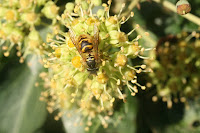 |
| Untidy and ineffective |
 |
| Common wasp on ivy flowers |
I did my monthly bird count in mid month. The headline was 20 pochard ducks, a record high number for October and continuing the large numbers from last winter. This increase in recent years is a welcome exception to the national decline. The 8 great-crested grebes and one grey heron add to the cormorant story in suggesting that there's a good number of small fish to be had. Wondering about the effect of the cull of geese on the golf course, I compared the numbers with previous Octobers. The 40 Canada geese was a little lower than average. The 9 Egyptian geese suggested a halving of numbers, so perhaps this species is being reduced? The 2 greylag geese was a remarkably low number even for October when numbers tend to be low. Previous counts of all three species are quite variable because they move around a lot, so counts from more months will be needed before any firm conclusions are possible. The waterweed no longer attracts large numbers of non-breeding mute swans. We have only the resident pair and their surviving 7 large cygnets, but coot numbers remain high, suggesting that this species is able to sustain itself on a leaner supply of waterweed (there's still quite a lot of rigid hornwort in the lake despite the efforts of the watersports people to rid the lake of waterweed).
Most wildflowers are now over, but there were some late flowers on horehound and ivy is in full flower. Many common wasps were taking advantage of this in the hedge near the Wimbledon Park Road entrance.
In the tree works early in the year, the honey locust tree amongst the shrubs near the lower brook was felled, but many suckers have emerged from its roots. The opportunity to recover a honey locust appears to be rejected because all the suckers had been cut back. As always, the hart's-tongue ferns on the Revelstoke road railway bridge brickwork have recovered from the most recent attempt to remove them. Following the premature removal of bedding plants near the cafe, others were being planted to replace them.
No comments:
Post a Comment